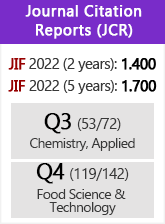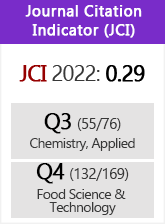Effects of soil salinity on the quality of ‘Arbequina' olive oil
DOI:
https://doi.org/10.3989/gya.2005.v56.i1.131Keywords:
Arbequina, Chemical composition, Salinity, Virgin olive oilAbstract
This work analyzes the effect of soil salinity on olive oil quality. The chemical composition of oils extracted from young ‘Arbequina' olives subject in the field to three soil salinity levels (low-L, medium-M and high-H) was determined throughout a period of three years. A total of 30 parameters were analyzed (moisture, oil content, acidity, peroxides, ultraviolet absorbances, poliphenols, aliphatic alcohols, sterols, waxes, and fatty acid composition). Soil salinity was measured on fourteen different dates with an electromagnetic sensor. Overall, salinity increased oil content (+15 % in H with respect to L) and decreased aliphatic alcohols (-29 %) and palmitoleic acid (-32 %) (values significant at P<0,05). The rest of the parameters were not affected by salinity (P>0,05). In summary, olive oil quality was practically independent of soil salinity and, according to the prevailing legislation, all the oils were classified as “extra virgin”.
Downloads
Download data is not yet available.
Downloads
Published
2005-03-30
How to Cite
1.
Royo A, Gracia MS, Aragüés R. Effects of soil salinity on the quality of ‘Arbequina’ olive oil. Grasas aceites [Internet]. 2005Mar.30 [cited 2024Apr.19];56(1):25-33. Available from: https://grasasyaceites.revistas.csic.es/index.php/grasasyaceites/article/view/131
Issue
Section
Research
License
Copyright (c) 2005 Consejo Superior de Investigaciones Científicas (CSIC)

This work is licensed under a Creative Commons Attribution 4.0 International License.
© CSIC. Manuscripts published in both the printed and online versions of this Journal are the property of Consejo Superior de Investigaciones Científicas, and quoting this source is a requirement for any partial or full reproduction.All contents of this electronic edition, except where otherwise noted, are distributed under a “Creative Commons Attribution 4.0 International” (CC BY 4.0) License. You may read here the basic information and the legal text of the license. The indication of the CC BY 4.0 License must be expressly stated in this way when necessary.
Self-archiving in repositories, personal webpages or similar, of any version other than the published by the Editor, is not allowed.
















